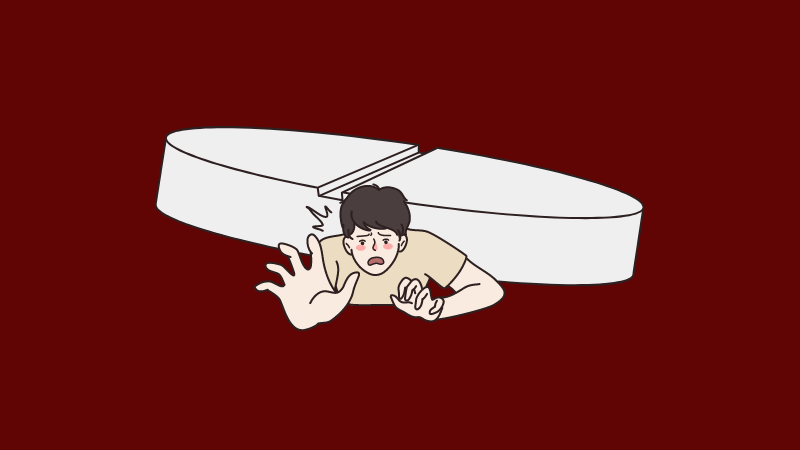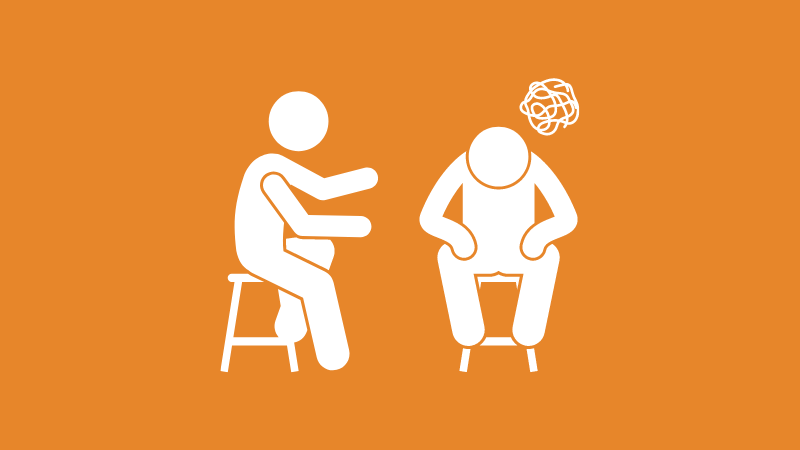Table of Contents
Affiliate link notice: As an affiliate of BetterHelp and other third-party vendors, We will receive compensation if you make a purchase using the links provided on this page. For more information, visit our disclosure page.
Last Updated on February 19, 2022 by Randy Withers, LCMHC
Do you ever hear a nasty voice in your brain telling you that you’re not attractive enough when you look in the mirror?
Maybe it’s an inner demon telling you that you’re too short, too skinny, too fat, have terrible hair, or look ugly.
If you have damaging thoughts about your body that affect your self-esteem, you may have body image issues.
A negative body image can affect your entire life. It can alter how you carry yourself each day or turn into a more severe disorder.
Understanding why this happens and how to cope with it is an essential part of overcoming body image issues.
This guide will help you identify what body image issues are and what you can do to heal from them.

What is body image?
According to the National Eating Disorders Collaboration, how a person perceives their physical self (body) and the thoughts and feelings associated with that perception is one’s body image. These thoughts and feelings can be positive, negative, or both.
There are four main aspects of body image that include perceptual, affective, cognitive, and behavioral body image.
1. Perceptual body image
Perceptual body image relates to how you view your body. This perception does not mean that is how others see you or reflect how your body actually is. For example, you may look in the mirror and see someone who is obese, when in reality, you are average weight.
2. Affective body image
Your feelings towards what you see in the mirror is your affective body image. These feelings reflect how satisfied or dissatisfied you are with what you see. If your perceptual body image is that you are “fat,” you will feel dissatisfied with your body.
3. Cognitive body image
Cognitive body image reflects how you think about your body and can lead you to worry about your weight and body shape. People may develop conditional thinking related to their body image. An example of this thinking is, “If I lose weight in my tummy, I’ll feel better about myself.”
4. Behavioral body image:
Behavioral body image is actions an individual takes due to their self-perception and feelings about their body. If your cognitive body image tells you’d be “happier if you were skinny,” you might develop an eating disorder or exercise excessively to achieve that. These actions are your behavioral body image.
Mental disorders related to negative body image issues
While body image issues are common in society, especially among women, they can sometimes become more extreme. When this happens, it interferes with an individual’s life and takes control. Extreme body image issues can turn into mental disorders that include anorexia nervosa, body dysmorphic disorder, bulimia nervosa, and severe depression.
Anorexia Nervosa
Those with anorexia nervosa suffer from a debilitating fear of gaining weight and equate being thin with self-worth. Even if you are severely underweight, the fear of gaining weight may cause you to undereat, over-exercise, vomit after meals, take laxatives, etc. While challenging, treatment can help you improve your self-esteem and condition.
Body Dysmorphic Disorder
If you suffer from body dysmorphic disorder, you can’t stop thinking about your perceived physical defects and flaws. Often, others cannot see this flaw, but they cause you to feel ashamed and anxious in social settings. Medication and cognitive behavioral therapy are treatments for this disorder.
Bulimia Nervosa
Bulimia nervosa is similar to anorexia nervosa in that it relates to extreme eating habits. However, those with bulimia often binge eat and purge the excess calories by vomiting or using laxatives afterward. Like anorexia, this stems from extremely negative body image perception. A medical or mental health professional can treat it.
Depression
Having a distorted view of your body image can cause depression. Having a healthy body image is a crucial part of your self-esteem. If you have a negative body image and self-esteem, it can heavily impact your mental health. However, treatment of depression and negative body image are similar.
Whom do body issues affect?
Body image issues can feel isolating, making you feel like you’re the only one experiencing them. However, they are more widespread than you think.
Women are more likely to develop mental disorders related to body image than men. Media outlets place heavy emphasis on appearance as a marker of a woman’s self-worth. An astonishing 56-96% of women worldwide in Dove’s Choose Beautiful Campaign said they wouldn’t describe themselves as beautiful.
Body image issues significantly impact adolescents. Teens are vulnerable due to the constant social and psychological changes they experience as their bodies change and minds develop. Compound that with the pressure to fit in, and you have a recipe for body image issues.
Men also face intense pressure to fit an ideal, masculine look. Media and movies emphasize tall, muscular men when that isn’t the average body type. The rise of fitness “influencers” has contributed to increased body image issues. This pressure can cause over-exercising and eating disorders.
Even people with the “ideal body type” can experience these issues. Researchers at UCLA found that both models and ordinary people in their study have body image issues.
While some groups tend to face these issues more, it’s something that can affect anyone.
7 Ways to overcome body image issues
#1 Realize that perfection is a myth
It is easy to think of perfection as black and white and that you are perfect or you’re not.
Perfection doesn’t exist.
No one is perfect.
Everyone has positive qualities about them, and everyone has flaws. Physical appearance isn’t everything.
People are complex beings who are more than just their bodies.
Everyone has different preferences for physical beauty, and standards are continually changing.
No one can live up to all the beauty standards out there.
They shouldn’t have to either.
Letting go of the idea that perfection exists can be freeing to someone with body image issues. No one is perfect, and that’s okay.
#2 Reduce your social media time
One way to stop holding yourself to unrealistic beauty standards and perfectionism is to reduce your social media time.
Social media sells the idea of perfection.
Scroll down your feed, and you’ll see the best parts of everyone’s lives. People post what they want others to see, and you don’t see 90% of their life.
Social media users only share photos that have the best lighting, angles, and filters. It might have taken them 100 shots to get the one they posted.
Studies have shown social media negatively impacts body image.
You can reduce this effect by limiting your intake.
#3 Embrace what makes you unique
Everyone’s body is different and has unique characteristics.
All bodies are beautiful, no matter their shape, size, and abilities.
Our bodies are what gives us life and allow us to do many things.
Genetics determine about 25-70% of our body composition. There are things that we can’t change about our bodies, and that’s okay.
What works for one body might not work for another, and trying to fit another person’s standard causes body image issues.
Learning to love what makes your body unique instead of hating what makes you different puts you on the trail to a more positive body image.
#4 Nourish your body
Taking care of your body is essential for creating a positive body image.
Body image issues can create an unhealthy relationship with food and exercise.
Becoming obsessed over calorie counting and excessive exercise can harm your body more than heal it. You can deprive your body of the energy it needs to function, making you feel worse about yourself.
Instead, focus on nourishing your body with food and exercise for a healthy body instead of seeking to achieve a perfect body. Doing this will help you feel good on the inside and support your physical and mental health to improve body positivity.
#5 Practice self-love
Giving your body emotional love can help promote a positive body image as much as nourishing it physically.
You can do this in several ways.
One is by listing all the things you love about your body and what your body does for you. By writing this out, you’ll remind yourself of the positive things your body does.
Another is to repeat positive affirmations to yourself until you believe them. When you catch yourself saying negative things about yourself, stop. Replace those negative thoughts by saying positive ones out loud.
Finally, be patient with yourself. Body positivity takes time, and don’t be hard on yourself if there are bumps in the road.
#6 Spark the change you want to see
If you influence others, creating an environment of body positivity in your circle can improve your body image.
Judging someone’s weight or appearance is common, and you may be doing it without realizing it. You could unintentionally be contributing to someone else’s negative body perceptions.
Be conscious of your own words and create a positive space around you.
If you avoid judging others by their appearance and realize it doesn’t define their worth, it’ll help you do the same.
Treat yourself and others how you deserve to be treated and be the change you want to see.
#7 Seek help
Sometimes, body image issues are the result of deeper problems. Your negative self-perception might stem from experiences that you have had and your environment. Some people find it difficult to fix on their own.
If your self-esteem and mental health issues seem overwhelming, there is no shame in seeking help.
Many people use cognitive behavioral therapy (CBT) to work through their issues.
A supportive mental health professional will be there to listen to you, explore the roots of your body image issues, and help identify solutions.
It can take time to heal, but you don’t have to do it alone.
BetterHelp, America’s number 1 provider of online counseling, has licensed therapists standing by to help. Sign up today and enjoy 10% off your membership with this link.
References
- What Is Cognitive Behavioral Therapy?
- Evidence for a role of developmental genes in the origin of obesity and body fat distribution
- How does social media use affect our body image?
- Whether a fashion model or not, some body image concerns are universal: App allows researchers to study body self-perceptions
- From Hair to Height: How Male Body Image Struggles Go Beyond Muscle
- Choose Beautiful | Dove Campaigns
- Gender Difference in the Prevalence of Eating Disorder Symptoms
- Body Image








